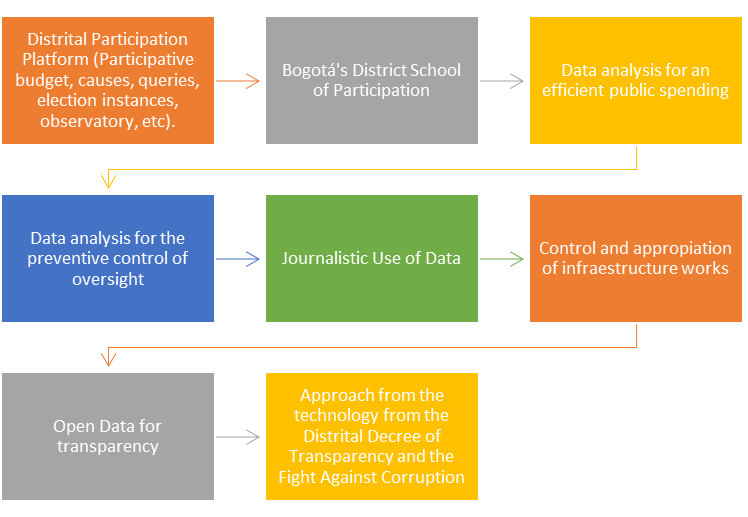3.5.1 Case Study: Bogotá Schools
Course subject(s)
Module 3. Planning Smart Sustainable Cities Initiatives
In this section, we will present a case study that describes the impact of main citizen participation initiatives in the Capital District of Bogotá and its District Development Plan.
The most recent Bogotá administrations have linked citizen participation with new agendas and projects related to building Colombia’s capital as a smart and sustainable city. This approach became evident when the 2020-2024 District Development Plan was defined as a New Social and Environmental Contract for the XXI Century Bogotá. The plan aims to promote Bogotá’s Open Government Strategy as a new governance model that significantly reduces the risk of corruption while allowing citizen control and government oversight. Therefore, three main objectives were defined:
- Achieve effective citizen participation in the city’s decision-making,
- Empower citizens of their social control through analytics and data access, and
- Accomplish public administration management that is visible and transparent for citizens.
The following initiatives were defined to promote Bogotá’s Open Governance.

In this context and for this case study, we selected one of the resources: Bogota’s District School of Participation. Bogota’s District School of Participation, created in 2007, is an essential asset in promoting citizen participation in Bogotá, designing and implementing free courses and spaces for citizens of the capital to get trained to participate in public affairs.
Despite the school’s 14 years of academic journey, the District School of Participation hasn’t shown a clear correlation between their formative offer and the increase of citizen participation in Bogotá, which is why it is evident that they are not prepared to educate the smart citizens that are needed for the achievement of the smart and sustainable city goals present in Bogotá’s 2020-2024 Development Plan.
Today, the biggest challenge for Bogota’s District School of Participation is to acquire the institutional and technical capacity to train and educate smart citizens that will help achieve a smart and sustainable city, according to Bogotá’s 2020-2024 Development Plan.
In this file, you can read the Case Study in more detail.

Smart and Sustainable Cities: New Ways of Digitalization & Governance by TU Delft OpenCourseWare is licensed under a Creative Commons Attribution-NonCommercial-ShareAlike 4.0 International License.
Based on a work at https://online-learning.tudelft.nl/courses/smart-and-sustainable-cities-new-ways-of-digitalization-and-governance/ /



